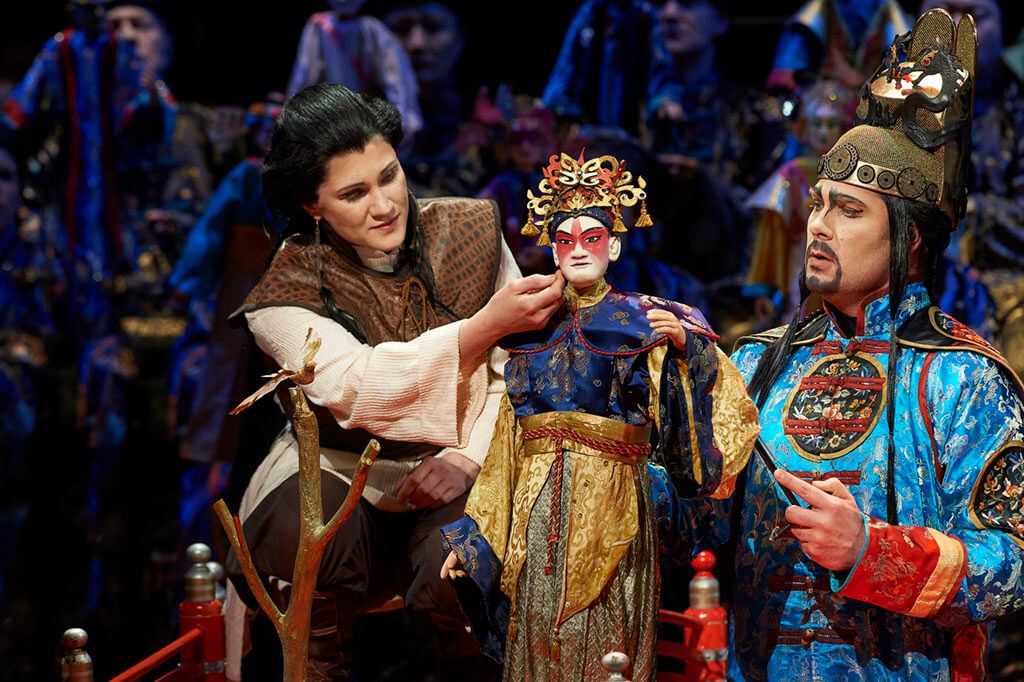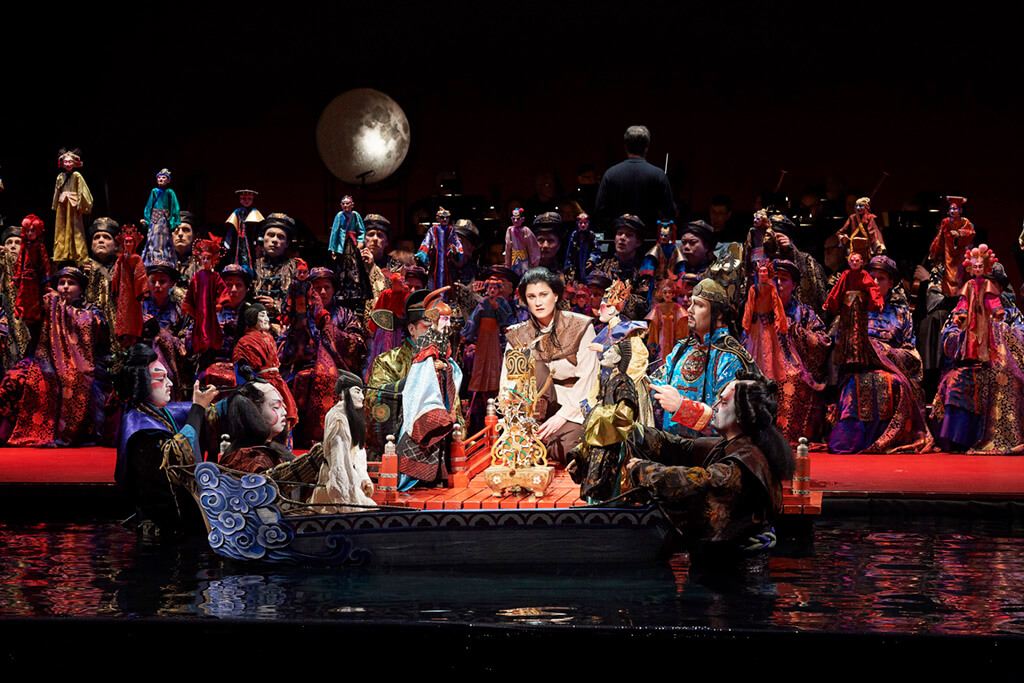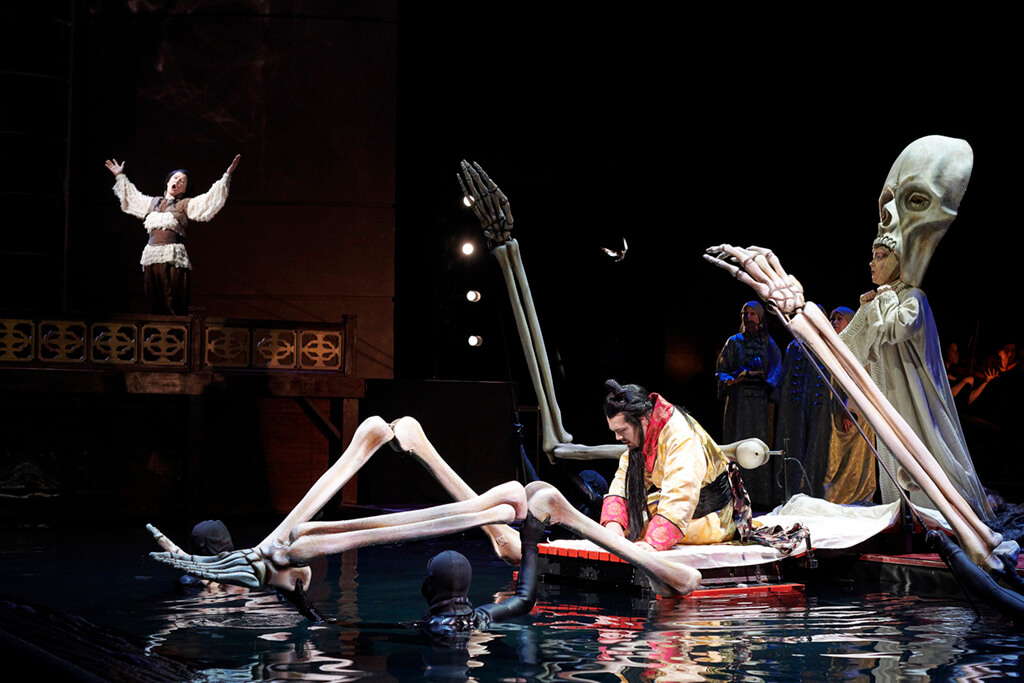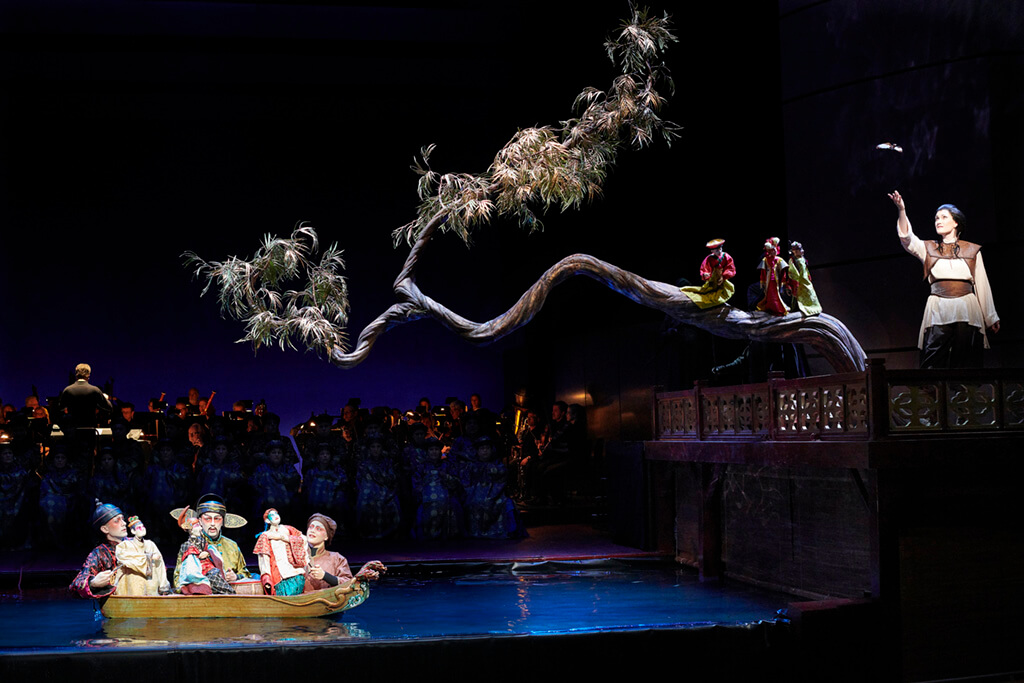
Canadian Opera Company: The Nightingale and Other Short Fables Robert Lepage (director), Johannes Debus (conductor). Through May 19 at the Four Seasons Centre for the Performing Arts. coc.ca
The Canadian Opera Company (COC) opens its spring season, in very unspring-like weather, with a revival of Igor Stravinsky’s The Nightingale And Other Short Fables. First seen at the Four Seasons Centre in 2009, it was such a hit with the audience that an extra performance was quickly added. The COC took it to the Brooklyn Academy of Music in New York, receiving positive notices. Now nine years later, would lightning strike twice? Can it repeat that same magic?
Due to conflicting events, I had to forgo opening night and settled for the second performance, which happened to be the next evening. A highly unusual situation as opera singers (especially the principals) are rarely if ever required to sing, unamplified, two days in a row. But then this Nightingale is no ordinary piece. Lepage has turned operatic conventions upside down with this show, introducing novel touches rarely seen in opera productions. The most dramatic is the use of copious amount of water, filling a fitted container in the orchestra pit to the brim, and using it as the central staging area. Meanwhile, the musicians are relocated on to the stage in the first half, and to the back of the stage in the second. Given Nightingale is only 45 minutes, a collection of other short works are included to flesh out the evening.

Another innovation is the highly intricate and creative use of shadow play, executed by puppeteers and acrobats from Quebec’s Ex Machina troupe. Shadow play is an old tradition in Asian theatre but rarely seen in the west. There’s also a spectacular collection of seventy-five puppets designed by Michael Curry. Lepage chooses to stay with the chinoiserie style popular in Stravinsky’s time, complete with the most opulent costumes. Some of the singers are wearing wetsuits under their elaborate costumes, up to their waist in water while manipulating the puppets. There’s an artificial tree that comes apart, and a freely moving “bird” perched at the end of an almost invisible pole, all enhanced with clever lighting effects. When these elements are as deftly executed as this production, we have a show that is a delight to the eyes.
Act 1 consists of a compilation of several short instrumental and vocal pieces. The opening work, the jazzy Ragtime (1918), sets the tone, followed by satirical peasant songs, a female choral piece, and short orchestral compositions interspersed with three clarinet solos. It ends with the “farmyard burlesque” The Fox (1916). With the performers in front of the orchestra and conductor, the evening has the feel of a concert performance, but the staging is so striking that there’s nothing static about it — in fact it’s positively dazzling. The reflections of the shimmering water on the ceiling of the auditorium alone is unforgettable.

The Nightingale (1914) occupies the entire Part 2. The story is based on a fairy tale by Hans Christian Andersen. In a nutshell — the Emperor is enchanted by the singing of the Nightingale, and invites the bird to be by his side, singing to him every night. But when the Japanese Envoy gives the Emperor a mechanical bird, the Nightingale flies away and the angry Emperor banishes her from the palace. When he becomes ill and at death’s door, the Nightingale returns and sings the Emperor back to health. On the surface, it’s just a fanciful fairy tale. But one could see this piece on a deeper level, as an allegory of the eternal struggle between Truth/Nature (as represented by the Nightingale) and the Falsehood of Human Artifice/Action (symbolized by the man-made mechanical bird).
The Emperor is spared from the grasp of Death, thanks to the life-sustaining power of Nature. The Lepage production captures its spirit beautifully. If there’s a fly in the ointment, it’s the small scale of the sets designed by Carl Fillion, down to the tiny Bunraku puppets designed by Michael Curry. Very beautiful to be sure, but if you are sitting in rear orchestra or in the third, fourth or fifth ring, it would be very hard to see. More than any other production I can think of, this show needs to be seen up close, and as central as possible. I was given an excellent media seat, but I can imagine those upstairs may find it problematic. In 2009, the audience in the Fifth Ring had to rely on a huge TV screen, and I am assuming it’s the same setup this time around.

Seen on April 14, it was a fine evening musically. COC Music Director Johannes Debus brought out fully the lyricism in the score, without diminishing the inherently angular and astringent nature of Stravinsky’s musical idiom. Kudos to soprano Jane Archibald for her crystalline tones as the Nightingale. Former COC Ensemble tenor Owen McCausland was an excellent Fisherman, singing beautifully and deftly negotiating the puppet while submerged to chest level in water. Moldovan bass Oleg Tsibulko made an auspicious COC debut as a vocally striking Emperor. In fact, everyone including the huge ensemble cast was well applauded by an enthusiastic audience. Just like nine years ago, an extra performance was added. Not to be missed.



